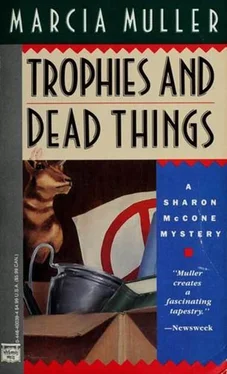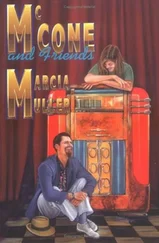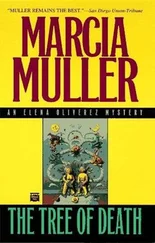As I drove along Clement Street, the district's busy shopping area, I noted eight Asian restaurants within two blocks: one Thai, one Japanese, one Burmese, two Vietnamese, and three different types of Chinese. Produce stands with outdoor bins full of bok choy and daikon radish, groceries with smoked ducks and barbecued pork ribs hanging in their windows, banks and insurance agencies with signs in both English and various Asian characters- all these stood side by side with such longtime institutions as Green Apple Books, Churchill's Pub, Woolworth's, and Busvan Bargain Furniture. Eight out of ten faces that I spotted were Asian-reflecting the same ethnic mix as the restaurants, and ranging from stooped old people pulling shopping carts to young couples emerging from Japanese-model sports cars. Clement Street, I thought, was the perfect embodiment of the changing cultural patterns of San Francisco.
Unfortunately, it is also one of the worst examples of the city's congested parking and traffic. The area was built up at a time when no one envisioned today's large population of both people and cars, and consequently there are too few parking lots and garages. Even at that relatively early hour, all the metered spaces were taken and trucks double-parked while making deliveries. Cars moved slowly, their drivers looking for vacancies at the curbs; other irate drivers made U-turns, slid through stop signs, and endangered pedestrians in the crosswalks. I waited behind an exhaust-belching Muni bus as it unloaded passengers, tapping my fingers on the steering wheel of my MG and giving mental thanks to Hank for remembering to tell me it was okay to park in the driveway of the house on Third Avenue- should I ever reach it.
After five more minutes of creeping along Clement, I rounded the corner onto Third and found the address Hank had given me: one of those two-flat buildings with a garage and illegal in-law apartment on the ground floor. Its facade was bastardized Victorian, mint green with mauve and tangerine trim-a combination that would cause even a person of minimal taste to cringe. Hank's Honda stood in the driveway, blocking the sidewalk. I looked around, saw that most of the residents had left their cars in a similar fashion, except for one enterprising soul who had pulled up parallel to the curb on the sidewalk itself. So much for parking regulations, I thought as I pulled in beside the Honda.
As soon as Hank came to the door of the downstairs flat, I was glad I'd agreed to help him. There were lines of strain around his mouth, and when he took his horn-rimmed glasses off to polish their thick lenses on the tail of his maroon corduroy work shirt, I saw that his eyes were clouded. Hank is a man who cares deeply for his clients-too deeply, perhaps, to maintain the distance needed when dealing with their problems. It's not that it renders him ineffectual; it just causes him more pain than he deserves.
I smiled reassuringly at him and stepped inside. The flat was chilly; Hank probably didn't want to waste the estate's money by turning up the heat. A narrow hallway ran the length of the building; at its end was a door through which I could see a kitchen table and refrigerator. To my left was a small living room with a bay window overlooking the street. I went in there and started to take off my suede jacket. Then I stopped; I might soil it while hefting cartons and furniture, but I'd be too cold without it.
Hank sensed my predicament. "I've got coffee on," he said, "and you can wear one of Perry's sweaters."
"Thanks." I followed him down the hall and into a bedroom that was even smaller than the living room. He rummaged through a pile of clothing that lay on the double bed, then tossed me a heavy green cardigan with a hole in one elbow and a raveled right cuff. When I put it on, it came down to my knees; I rolled up the sleeves to wrist length. Perry Hilderly, the deceased client, had been a big man.
Hank was already on his way to the kitchen. By the time I got there he'd poured coffee and was holding out a mug. I took it, then peered through a door to the left. It led to a dining room with a fireplace and built-in leaded-glass cabinets-standard for this type and vintage of flat. The room contained no furniture, nothing but cardboard boxes with the name BEKINS stenciled on them.
I looked at Hank, eyebrows raised inquiringly.
"It's the stuff Perry moved here years ago, after his divorce," he said. "He wasn't much of a homebody. Accountants never are, I guess."
It was one of those blanket statements Hank sometimes makes-bald assumptions with little or no basis in fact. They always startle me, considering the variety of individuals with full complements of quirks that he's seen wander through the door of All Souls year after year. Such typecasting of his fellow man is a product of his early environment- his mother is quite adamant in her pronouncements about others-and since he never allows it to cloud his judgment, I can put up with it without comment.
I went over to the refrigerator to look at a color snapshot that was held up there by a magnet. It showed a tall, lanky man with curly blond hair and granny glasses; he wore a Giants sweatshirt and was flanked by two similarly attired blond boys who were only tall enough to reach to his waist. "This is Hilderly, right?"
"Uh-huh. It's an old photo; his boys are in their teens now."
I examined it more closely. "He doesn't look all that different from the way he did in the nineteen sixty-five picture that they ran in the Chron the morning after he was shot. Of course, his hair was long and wild back then."
Perry Hilderly had been one of the founders of the Free Speech Movement at U.C. Berkeley in the 1960s. Although I'd still been in high school then, I'd taken a great interest in the changing mood on the campuses-probably because I was the white sheep in a family of rebels and envied both my siblings' and the students' ability to blatantly challenge authority. My impressions of Hilderly were somewhat vague, but I recalled television coverage of the protests in which he could be seen clowning around on the periphery.
Hank said, "Do you remember him?"
"Some."
"I'm surprised."
I sat down at the kitchen table with him. "Why?"
"Well, you were just a baby then."
I smiled. Hank is only six years older than I, but he has always taken a paternalistic stance toward me. Partly this is because when we met at Berkeley-years after Hilderly had passed from that scene-he was a world-weary law student with the horrors of Vietnam behind him, while I was an undergrad whose toughest battles had been fought in the trenches of the department store where I'd worked in security before deciding to go to college. Over the years the balance of world-weariness has shifted more to my side, but Hank persists in the notion that he must watch out for and guide me. I know, although we've never discussed it, that this persistence is fueled by the fact that our friendship has never been endangered by romantic entanglement. Hank's paternalism is designed to preserve the status quo.
"Still, I remember him," I said, "even if he never received as much media attention as Mario Savio."
"Well, few people had Mario's charisma. Perry's comedic style was a bit like Abbie Hoffman's, but not nearly as outrageous. And there were a lot of lesser luminaries hogging the limelight." Hank's smile was reminiscently wry.
I knew what he was thinking; as a friend of mine once put it, not many of the sixties people have "held up." Few went on to achieve the heights that those on the sidelines expected of them. But for a time such visionaries as Mario Savio had captured the imagination of a generation. Mario, who one fall day in 1964 respectfully removed his shoes before climbing atop a police car that had been entrapped by some three thousand students protesting the arrest of a civil-rights worker on the Cal campus. Mario, who seized a microphone and involved others in the crowd in a thirty-hour spontaneous public dialog that forever changed the university, the youth of America, the nation itself. No, Perry Hilderly hadn't held a safety match to Mario Savio's incandescence, but he had brought humor to a basically humorless movement, had defused potentially dangerous situations with his wit.
Читать дальше












